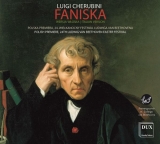 Luigi Cherubini: Faniska; Natalia Rubiś (Faniska), Tomasz Rak (Oransky), Robert Gierlach (Zamoski), Krystian Adam (Rasinski), Katarzyna Belkius (Edwige), Justyna Olow (Moska), Piotr Kalina (Rasno), Poznan Philharmonic Choir & Orchstra, Lukasz Borowicz; 2 CDs Dux 1694/95; Aufnahme 2020, Veröffentlichung 12/2020 (114'28) - Rezension von Remy Franck
Luigi Cherubini: Faniska; Natalia Rubiś (Faniska), Tomasz Rak (Oransky), Robert Gierlach (Zamoski), Krystian Adam (Rasinski), Katarzyna Belkius (Edwige), Justyna Olow (Moska), Piotr Kalina (Rasno), Poznan Philharmonic Choir & Orchstra, Lukasz Borowicz; 2 CDs Dux 1694/95; Aufnahme 2020, Veröffentlichung 12/2020 (114'28) - Rezension von Remy Franck
Von der 1806 am Wiener Kärntnertor-Theater uraufgeführten Oper Faniska heißt es, sie sei sowohl von Haydn als auch von Beethoven enthusiastisch aufgenommen worden. Das Libretto gibt es in deutscher und italienischer Sprache. Es basiert auf dem Melodrama Les Mines de Pologne des aus Nancy stammenden französischen Theaterautors René Charles Guilbert de Pixérécourt. Die Handlung spielt in Polen, von wo auch die Erstaufnahme der Oper kommt.
Zamoski, der Freiherr von Sandomir, befiehlt seinem Gefolgsmann Oranski, Faniska, die Frau des Freiherrs von Rava, Rasinski, zu entführen. Faniska wird zu Zamoskis Schloss gebracht. Diverse Versuche, sie zu befreien, scheitern. Nachdem sie mit ihrem Mann eingekerkert worden war, gelingt dem Paar schließlich mit Rasnos Hilfe die Flucht. Rasinskis Soldaten greifen das Schloss an, Zamoski wird getötet, Oranski wird gefangen genommen und vor Gericht gestellt.
Faniska wird manchmal als Opéra Comique, meistens aber (und zutreffender) als Oper in drei Akten oder sogar als ‘Große heroische Oper’ bezeichnet.
Wie schon Lodoïska ist auch Faniska ein typisches Beispiel für die Gattung ‘Rettungsoper’. Cherubini hat sein ganzes melodisches Talent investiert, das im Vergleich zu Lodoiska deutlich an Qualität gewonnen hat.
Natalia Rubis singt die technisch schwierige Titelrolle sehr einfühlsam und mit schön geführter, aber etwas enger Stimme. Krystian Adam bleibt als ihr Gatte Rasinski allzu blass. Auch Piotr Kalna als Rasno singt nicht frei genug. Die Nebenrollen sind mehr oder weniger gut besetzt.
Mit nur einer wirklich guten Stimme, jener des Bassbaritons Robert Gierlach als Zamoski, ist die vokale Seite etwas schwach. Dafür beeindruckt Lukasz Borowicz als Dirigent umso mehr. Er legt viel Leichtigkeit und Transparenz in den Orchesterpart, den er bewundernswert kontrolliert und mit vielen Details belebt.
Weil Cherubinis Partitur so phantasievoll und so eng mit dem Drama verbunden ist, zählt das viel.
The opera Faniska, which premiered at the Kärntnertor Theatre in Vienna in 1806, is said to have been enthusiastically received by both Haydn and Beethoven. The libretto is available in German and Italian. It is based on the melodrama Les Mines de Pologne by the Nancy-born French playwright René Charles Guilbert de Pixérécourt. The action takes place in Poland, from where the first recording of the opera also comes.
Zamoski, the Baron of Sandomir, orders his henchman Oranski to kidnap Faniska, the wife of the Baron of Rava, Rasinski. Faniska is taken to Zamoski’s castle. Various attempts to free her fail. After being imprisoned with her husband, the couple finally manage to escape with Rasno’s help. Rasinski’s soldiers attack the castle, Zamoski is killed, Oranski is captured and put on trial.
Faniska is sometimes called an opéra comique, but more often (and more accurately) an opera in three acts or even a ‘grand heroic opera’.
Like Lodoïska, Faniska is a typical example of the ‘rescue opera’ genre. Cherubini invested all his melodic talent in this work. Compared to Lodoïska his talent has clearly gained in quality.
Natalia Rubis sings the technically difficult title role very sensitively and with a beautifully led but somewhat tight voice. Krystian Adam remains all too pale as her husband Rasinski. In the role of Rasno Piotr Kalna’s singing is rather strained. The supporting roles are more or less well cast.
With only one really good voice, that of bass-baritone Robert Gierlach as Zamoski, the vocal side is somewhat weak. On the other hand, Lukasz Borowicz is all the more impressive as the conductor. He puts a lot of lightness and transparency into the orchestral part, which he controls admirably, enlivening it with many details.
Because Cherubini’s score is so imaginative and so closely connected to the drama, this counts for a lot.






















